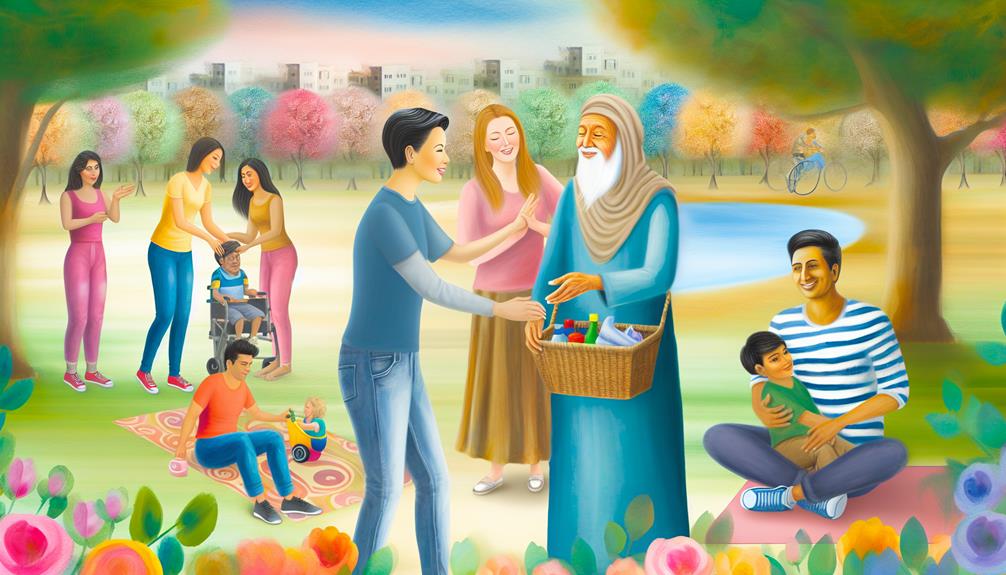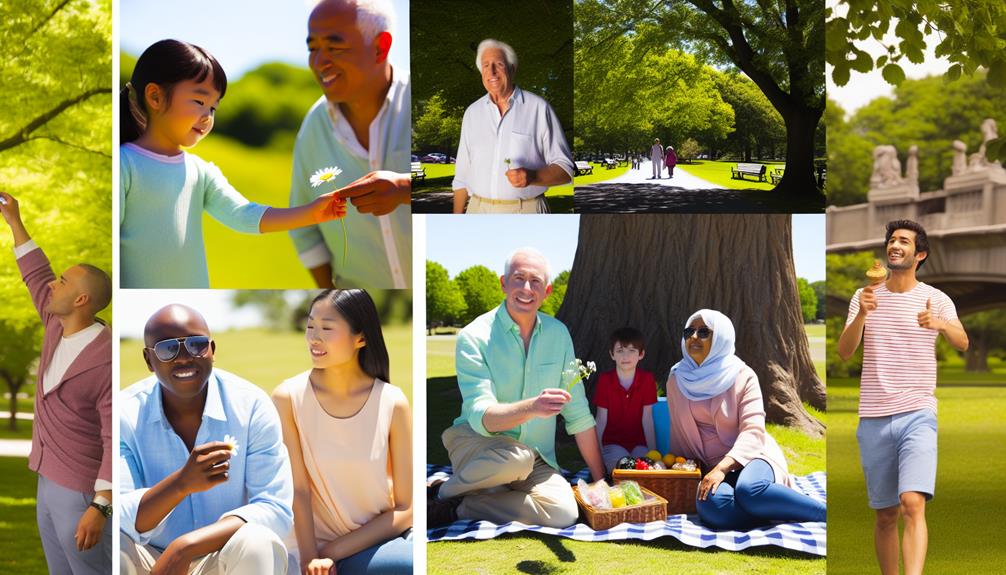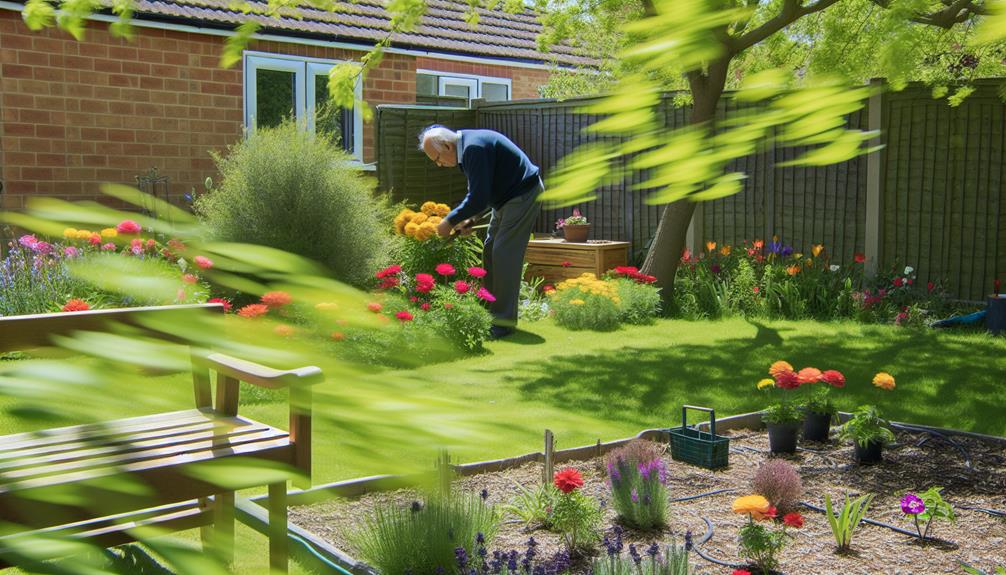Small acts of kindness, such as a simple smile or a heartfelt compliment, can create powerful connections and foster a sense of community. These gestures uplift spirits and promote a culture of compassion, leading to stronger relationships and increased trust. In workplaces, expressing gratitude enhances teamwork and employee satisfaction, while community engagement initiatives strengthen social bonds. Additionally, performing acts of kindness benefits the giver by boosting mood and self-esteem. Whether through everyday gestures or organized volunteering, the impact of kindness resonates deeply. Explore how these small acts make a significant difference in both individual lives and communities.
Key Takeaways
- A simple compliment can uplift someone's mood and reinforce positive self-image, making a lasting impact on their day.
- Writing a heartfelt note of appreciation strengthens relationships and shows others they are valued.
- Offering assistance to a colleague or neighbor fosters community spirit and encourages teamwork.
- Engaging in random acts of kindness, like paying for someone's coffee, creates joy and cultivates a culture of generosity.
- Volunteering for local initiatives not only helps those in need but also builds a stronger, more connected community.
The Power of a Smile

Radiating warmth and positivity, a smile can serve as a powerful catalyst for connection in our daily interactions. The smile impact extends far beyond mere facial expression; it fosters an environment of understanding and belonging. When we share a smile, we not only uplift our own spirits but also invite others into a shared moment of joy, creating a ripple effect of contagious joy that can brighten even the dullest of days. Additionally, smiling can help mitigate the effects of stress, which is known to weaken the immune system. By fostering positive interactions, we can promote emotional well-being and resilience, reducing the physiological impacts of stress on immunity.
Research indicates that smiling can lead to improved mood and social dynamics. A simple smile can transform a stranger into a friend, bridging gaps that might otherwise remain unaddressed. It holds the remarkable ability to diffuse tension and promote empathy, illustrating our innate desire for connection.
In a world where isolation can feel overwhelming, the power of a smile becomes essential. By offering this small yet significant gesture, we contribute to a culture of kindness and inclusivity. Each smile exchanged has the potential to create a sense of community, reminding us that we are not alone in our journeys. Embracing the power of a smile can indeed forge bonds that enrich our lives and those around us.
Everyday Gestures That Inspire
While a smile can serve as a profound connector, it is only one of many everyday gestures that inspire kindness and foster community. Simple acts, such as leaving heartfelt notes for loved ones or surprising a friend with a random surprise, can create ripples of positivity. These gestures remind us of the strength found in human connections and the importance of nurturing them.
| Gesture | Impact |
|---|---|
| Heartfelt Notes | Boosts morale and fosters connection |
| Random Surprises | Creates joy and strengthens relationships |
| Compliments | Enhances self-esteem and encouragement |
| Acts of Service | Builds trust and community solidarity |
| Listening | Validates feelings and deepens bonds |
Engaging in these small but significant gestures can transform ordinary moments into extraordinary experiences. They cultivate an environment where individuals feel valued and connected. In a world increasingly focused on the fast pace of life, it is essential to slow down and appreciate the power of everyday kindness. Each thoughtful action not only uplifts others but also enriches our own lives, creating a cycle of goodwill and belonging.
Kindness in the Workplace

Kindness in the Workplace
Fostering kindness in the workplace can greatly enhance both employee satisfaction and productivity. When employees feel valued and supported, they are more likely to engage in meaningful team collaboration and contribute to a positive atmosphere. Practicing patience and understanding, much like navigating challenges with ADHD, can also create a more compassionate workplace environment. Here are four small acts of kindness that can make a significant impact:
- Express Gratitude: A simple "thank you" can go a long way in making colleagues feel appreciated.
- Offer Help: Proactively assisting a coworker with their tasks fosters a spirit of teamwork and camaraderie.
- Listen Actively: Taking the time to genuinely listen to a colleague's concerns promotes trust and strengthens relationships.
- Celebrate Achievements: Acknowledging both small and large accomplishments creates a culture of recognition and boosts morale.
Community Engagement Opportunities
Community engagement opportunities play an essential role in strengthening the fabric of society by encouraging individuals and organizations to collaborate for the greater good. By participating in local initiatives, community members can foster connections that enhance social cohesion and promote a sense of belonging. Just as elite competition platforms in youth sports provide valuable experiences for young athletes, community engagement allows individuals to develop skills and build confidence through collaboration.
Volunteering options abound, catering to diverse interests and skills. From organizing food drives to mentoring youth, these opportunities allow individuals to contribute meaningfully to their communities. Engaging in such activities not only addresses immediate needs but also builds networks of support among residents.
Local initiatives often reflect the unique challenges and strengths of a community, making participation impactful on a personal level. Whether it's participating in clean-up days, supporting local arts, or joining neighborhood watch programs, each act of kindness contributes to a more vibrant and resilient community.
Moreover, community engagement fosters a culture of empathy and cooperation. By working alongside others, individuals gain a deeper understanding of their neighbors' experiences, which can lead to lasting friendships and collaborative solutions. Ultimately, embracing community engagement opportunities enriches lives and cultivates a collective spirit that benefits everyone.
Benefits of Kindness for You

Engaging in acts of kindness not only benefits the community but also has profound positive effects on individuals. The self-care benefits derived from kindness contribute considerably to our overall well-being, fostering a sense of connection and belonging. Additionally, just as understanding real-time currency rates can inform financial decisions, practicing kindness can enrich your emotional landscape. Here are four key benefits of kindness for you:
- Enhanced Mood: Acts of kindness release endorphins, which can elevate your mood and reduce feelings of anxiety or depression.
- Stronger Relationships: Kindness fosters trust and strengthens social bonds, creating a supportive network that enhances your sense of belonging.
- Increased Emotional Resilience: Engaging in compassionate acts can build emotional resilience, enabling you to navigate life's challenges with greater ease.
- Boosted Self-Esteem: Helping others can enhance your self-worth, reinforcing the belief that you have a positive impact on the world around you.
Frequently Asked Questions
How Can I Encourage Others to Perform Small Acts of Kindness?
Encouraging others to perform small acts of kindness can be effectively achieved through the implementation of kindness challenges within your community. By promoting community involvement, individuals can engage in collective efforts that foster a supportive environment. Organizing events, sharing success stories, and recognizing participants can inspire further action. Creating a culture where kindness is celebrated not only enhances individual relationships but also strengthens community bonds, fostering a sense of belonging and collective purpose.
What Are Some Examples of Kindness for Introverts?
Introverts often express kindness through quiet gestures that foster meaningful connections. Simple acts such as sending a heartfelt note, offering a listening ear, or sharing a favorite book can resonate deeply. Volunteering for behind-the-scenes roles or organizing small gatherings creates an inclusive atmosphere. These subtle expressions not only enrich relationships but also cultivate a sense of belonging, proving that even the most modest acts can greatly impact others' lives, particularly in introverted communities.
How Can Technology Facilitate Acts of Kindness?
Technology can greatly facilitate acts of kindness through the concept of digital empathy. Kindness apps, for instance, allow users to easily share positive messages, support local charities, or participate in community service initiatives. These platforms foster a sense of belonging by connecting individuals who share similar values and encourage collective efforts in spreading kindness. By leveraging technology, we can enhance our ability to engage in meaningful acts that resonate with others and promote a compassionate society.
What Are the Long-Term Impacts of Kindness on Mental Health?
The long-term impacts of kindness on mental health are profound, as evidenced by extensive kindness research. Engaging in acts of kindness fosters a sense of belonging and community, contributing to psychological benefits such as reduced anxiety and improved mood. By promoting positive social interactions, kindness enhances emotional resilience and overall well-being. Embracing kindness not only uplifts individuals but also cultivates supportive environments, reinforcing the interconnectedness that underpins our mental health.
Are There Specific Cultural Differences in Expressing Kindness?
Cultural differences markedly influence kindness expressions, shaped by distinct cultural norms. In collectivist societies, such as Japan or India, kindness may manifest through communal support and indirect communication. Conversely, individualistic cultures, like the United States, often emphasize direct expressions of kindness, such as verbal affirmations. Understanding these variations fosters a deeper appreciation for how kindness is conveyed and received, promoting a sense of belonging and connection across diverse communities.





